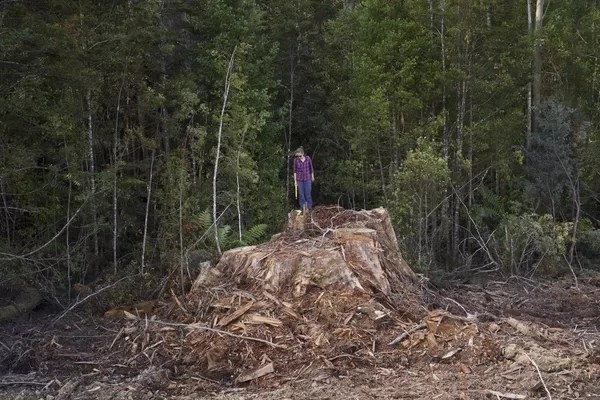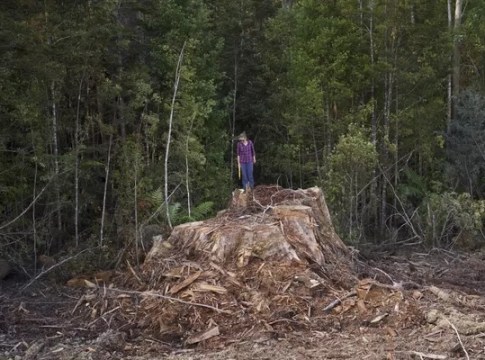An open letter signed by Australian and international forestry and climate experts has called for the immediate nationwide cessation of all native forest logging in response to the climate, fire, drought and biodiversity loss crises currently facing Australia.
The letter, signed by scientists from countries including Australia, USA, Canada, New Zealand and more, warn that native forest logging increases fire hazards and calls for the redeployment of forestry workers into fire services and national park management roles.
Signatories to the letter include Professor Tim Flannery from the University of Melbourne, Distinguished Professor James Kirkpatrick and Dr Jennifer Sanger from the University of Tasmania, Mr Andrew Bluhm from the Oregon State University and Associate Professor Janette Bulkan from the University of British Columbia.
“In the current climate crisis, our trees are worth more standing”
“This fire season has decimated a lot of forests and what is left must be prioritised for animal habitat and carbon stores. To cut down even more native forest does not make any sense.”
says Dr Jennifer Sanger, researcher and forest ecologist at the University of Tasmania.
Leanne Minshull, Director of The Australia Institute Tasmania, says that continuing to log native forests in the wake of Australia’s current bushfire crisis would be irresponsible.
“Native forest logging is heavily subsidised by the Australia taxpayer. Rather than spending public money to benefit private businesses and worsen fire conditions, we should be ceasing commercial native forest logging altogether and working towards fire mitigation,” Minshull says.
“Logging essentially turns forests into kindling and dries out the understorey, while Australian old-growth native forests, especially our wet eucalypt forests, burn less intensely and should be protected.
“The Government should recognise the importance of retaining Australia’s native forests in response to the bushfire crisis, and immediately cease all native forest logging throughout Australia.”
Leanne Minshull, Director of The Australia Institute Tasmania
The opportunity for Australia’s native forests – This is a good primer to understand the Forestry crisis.
Scientific data suggest that logging reduces carbon storage, threatens native species and increases fire hazard. Economic data over two decades show that native forest logging requires substantial public funding to operate.
Plantations can produce all the wood Australia needs to support a forest products industry, export of woodchips and raw timber. Specialty timber requirements can be met by salvaging submerged trees up to 1000 years old in Tasmania.
By protecting native forests, Australia can maintain its wood supply, rural jobs and biodiversity and in the process reduce fire hazard, species loss and greenhouse gases. This would provide alternative employment for forestry workers and make communities safer.
LOGGING INCREASES FIRE HAZARDS,
CEASE ALL NATIVE FOREST LOGGING IN AUSTRALIA
An open letter to the Parliament of Australia,
Sadness at the losses from the fires sears our souls. Worse might lie in wait.
We write to ask you to respond to the climate, fire, drought and biodiversity loss crises with an immediate nationwide cessation of all native forest logging.
We need our forestry workers to be immediately redeployed to fire services support and national park management to help protect the forests and us from fire.
Large, old-growth trees are important for carbon capture and storage and they keep on capturing carbon for their entire life.
Logging increases fire hazard in the short term. Many native species rely on unlogged forests.
Our timber needs can be met from existing plantations, with no need to log native forests.
Native forest logging is heavily subsidised by our taxes, which can be better spent on fire mitigation.
This is above politics – please show the leadership Australia desperately needs.
Mr Andrew A. Bluhm Associate Program Director Hardwood Silviculture Cooperative, Department of Forest Ecosystems and Society, Oregon State University
Prof Louise Ashton Assistant Professor School of Biological Sciences, University of Hong Kong
Prof James Kirkpatrick Distinguished Professor Geography and Spatial Sciences, University of Tasmania
Prof Tim Flannery Melbourne Sustainable Society Institute, University of Melbourne
Dr Margaret Lowman Visiting Professor University of Singapore, Director of TREE Foundation, Earthwatch Science Advisor
Ms Kate Fraser PhD Candidate Institute of Marine and Antarctic Studies, University of Tasmania
Dr Chloe Lucas Post-doctoral Research Fellow Geography and Spatial Sciences, University of Tasmania Ms Catherine Kirby Research Manager University of Waikato, New Zealand
Dr Jen Sanger The Tree Projects Geography and Spatial Sciences, University of Tasmania
Prof William Laurance Distinguished Research Professor, Australian Laureate & Prince Bernhard Chair in International Nature Conservation, Director of the Centre for Tropical Environmental and Sustainability Science, College of Science and Engineering
Dr Lisa-ann Gershwin Director, Australian Marine Stinger Advisory Services Assoc
Prof Janette Bulkan Associate Professor Department of Forest Resources Management, Faculty of Forestry, University of British Columbia
Dr German Soler PhD Marine Science, University of Tasmania
Dr Tim Cadman Research Fellow Institute for Ethics, Governance and Law, Griffith University
Dr Carolina Garcia Imhof PhD Environmental Sciences, University of Tasmania
Mr John Palmer Honorary Research Associate, Department of Forest Resources Management Faculty of Forestry, University of British Columbia
Dr Dominick DellaSala President and Chief Scientist, Geos Institut
Dr Nick Fitzgerald Ecologist, University of Tasmania Prof e John Church Climate Change Research Centre, University of NSW
The open letter signed by Australian and international scientists can be read in full here. Supplementary briefing note can be downloaded here.





